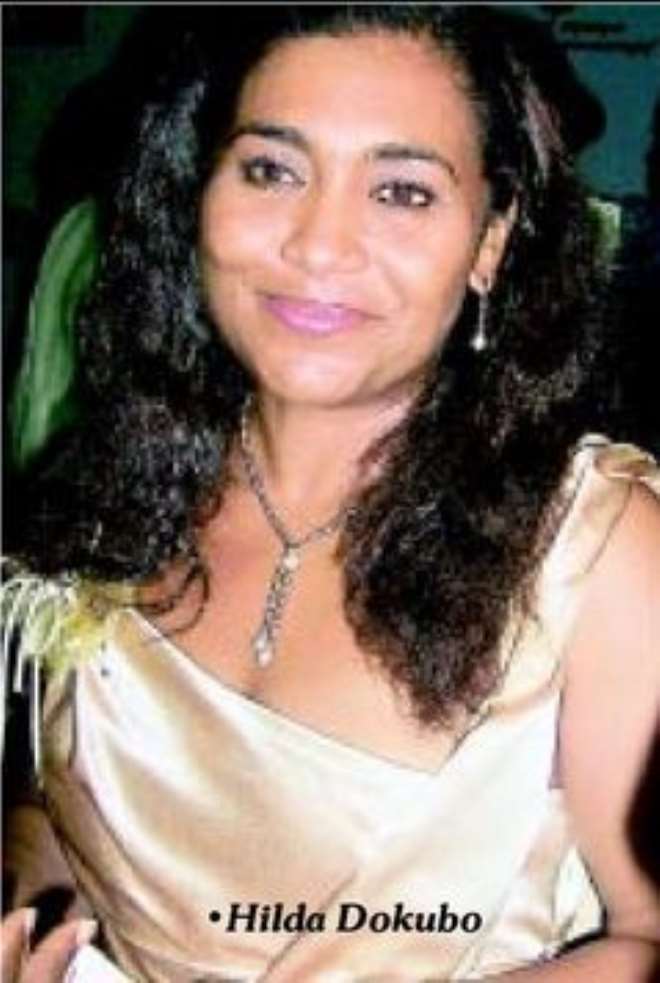HILDA DOKUBO-MRAKPOR WAS LITERALLY BREATHING FIRE
MONTHS after the Nigerian Army promised to assist the nation's movie industry otherwise called Nollywood, practitioners in the sector, may just have to wait a little while longer for it and other government agencies to redeem their promises.
Chief executive of the Nigerian Film Corporation, NFC, Jos, Mr. Afolabi Adesanya had cause to visit the then Chief of Army Staff (now Chief of Defence Staff), Lt. Gen. O. A. Azazi who stressed the need to correct and put in proper perspective the image of the Nigerian Army through Nigerian films.
Receiving the NFC delegation recently at the Army Headquarters, Abuja. Lt. Gen. Azazi reiterated the need to have the right image of the Nigeria Army ingrained in the minds of Nigerians, home and abroad.
He informed that the image of the Nigerian Army is very paramount to the Army High Command against the background of the institution's leading roles in the past years, especially within the West African sub-region, and peacekeeping globally.
He frowned at the wrong usage of ranks and epaulette and in most cases the resort to outright disregard for military ethics and operational norms in most of the films produced by Nigerian filmmakers.
"The prevalence of these production errors, portends a great danger," said Gen. Azazi. He stressed that what an average person sees, is the evil and negative aspects of the Nigerian Army, which according to him, is not the true portraiture of the Army.
The General, however praised the ingenuity that abound within the film industry and announced the readiness of the Nigerian Army to assist filmmakers who require military inputs for their projects. He commended those who, through their productions, have earned well-deserved accolades for the nation.
The Chief of Army Staff also informed the delegation that the authorities of the Nigerian Army have since 1999 taken the issue of the image of the Army very seriously, and this has led to the deliberate training and retraining of its officers and men. He announced that the new army uniform, which has been introduced, was also intended to provide a favourable image for the Nigerian Army and by implication the Nigerian state.
Speaking earlier at the meeting, the NFC boss, Mr. Adesanya said that his delegation was at the Army Headquarters to broker a formal working relationship between filmmakers in Nigeria and the Nigerian Armed Forces.
Adesanya briefed the Army chief on the mandate and operations of the NFC, which, according to him, includes the facilitation of the production of films in Nigerian through its services as a film commission and a developmental agency.
The NFC boss said the Nigerian filmmakers ordinarily would have been able to make films on any of the arms of the Nigerian armed forces with enough technical depth, but for the absence of access to military advisers, required facilities and equipment. This he said explained the attempt by the NFC to move in and open up discussions with relevant authorities that will harmonise existing synergy and symbiotic relationships.
He further remarked that, the efforts and role of the Nigerian Army over the years and especially in peacekeeping activities within the sub-region and globally has become a source of pride to all Nigerians. And as such, the corporation, through the National Film Institute, Jos, will be willing to train and retrain members of the Army (other services inclusive) on filmmaking and on how to document its activities.
The NFC, Adesanya said, has already visited Headquarters of the 3rd Armoured Division of the Nigerian Army, Jos on how to partner with the division on training and for the utilisation of the Theatre Hall of the division for the benefit of officers and men of the Division.
Responding to the concerns of the NFC boss on the need to have a formal relationship between the Nigerian Army and Nigerian filmmakers, the Chief of Army Staff promised his support for the setting up of a committee to facilitate a formal working relationship. He promised to ensure that the Nigerian Army provides the necessary assistance and support to film professionals through the Nigerian Film Corporation.
The Army boss said that the Nigerian Army recognised the place of film in human development and as such it would utilise every appropriate opportunity to have the Nigerian Public have the right perspective, and an authentic picture of the Nigerian Army.
Late last year, the Director of Army Public Relations, Col. A. M. Olaniyan expressed the reservation of the Army High command about the distorted image of the Nigerian Army in Nigerian films. He spoke extensively on the conflict of roles, which had to do with age and physical appearances of actors wearing military ranks that do not conform to military hierarchy and norms.
A filmmaker who pleaded anonymity last week was lamenting his plight about an alleged shabby treatment he received when he sought the assistance of the Army headquarters in using some army facilities he regarded as "not too sensitive."
"What we get to here is lip service from every sector in government, they praise Nollywood on pages of paper and pledge assistance, but when the chips are down, they won't come to our aid."
The filmmaker claimed he wrote a letter to the army headquarters asking for permission to use a combat training field for a movie scene, "and some uniforms too, but up till now, I have not got a reply, not even an acknowledgement of the letter."
Popular actress, Hilda Dokubo-Mrakpor was literally breathing fire at a workshop in Abuja recently where she lambasted some government agencies for what she termed hypocritical attitude towards Nollywood. "If I am asked to bring N200, 000 before I could shoot a scene at the any of our international airport, is that support from government? When we talk about support from government, we are not saying give us tons of money. If for instance, I wanted to shoot at an army or police or navy facility and the doors are wide open for me, that is the support we are talking about. So, if government is sincere and wants to help the industry, it should start thinking in the direction, because if the N200,000 fee I would have paid at the airport is waived, this would go a long way to cushion the effect of the financial burden on me."
She also said Nollywood movies would become more realistic if scenes are shot on exact locations such as army or police installations across the country, "without breaching the nation's security. In the United States, filmmakers enjoy these privileges and that is why you would see a U. S. army plane which is a message to the world about the might of their army," she said.
Dokubo-Mrakpor may have a point there. She won't be the first filmmaker to complain about the exorbitant fee "airport authorities" charge filmmakers to shoot at the government facility. If that is the common practice worldwide (charging fees to shoot at airports) the producer of the Hollywood movie entitled Terminal, may have spent a fortune to shoot the movie, because most scenes were shot at an airport. Whoever collects this 'fee' supposedly on behalf of the Federal Airport Authority of Nigeria, FAAN, would not be able to justify it, and in the words of Dokubo-Mrakpor, the person according to critics, is not doing the industry any good. Critics are of the opinion too that a collaboration with Nollywood producers would do the security organisation a wealth of good just as Hollywood has been able to show the world the American army and police might. A typical crime scene in a Hollywood movie would feature over 20 patrol cars; or the situation where the police is on the trail of a suspected criminal, aside over a dozen police cars, a helicopters would be seen hovering in the air.
There is usually no route of escape for a criminal in the U.S, at least that is what Hollywood filmmakers have made us to believe. This is not just a morale booster to men of the armed forces, it gives the citizens some air of confidence in their security organisations. But then, everything should be put in place to make the security forces effective, so that Nollywood filmmakers would not be showing falsehood to their viewers.
But the story is not the same at Prof. Dora Akinyuili's National Agency for Food, Drugs Administration Control, NAFDAC. A Nollywood filmmaker who just finished the shooting of a soap on the evils of fake drugs (and consequences of dealing in them) was full of praises for the woman that has done so much to rid the country of fake and adulterated drugs in the last couple of years. "She not only opened her personal office for us (the crew and cast), she made sure that some of the staff were on hand to assist us even at weekends when we were shooting. That woman is wonderful. I had to decline when she offered us her official apartment in Ikoyi, Lagos, for security reasons; she was just to co-operative."
She said Prof. Akinyuili said clearly that NAFDAC has no budget for such initiative, "but she would make sure that we got all the necessary support and that was what we got and more. At the end of the day, money would not have got us all the things we got in terms of co-operation from the Iron Lady."
Perhaps the armed forces and others should borrow a leaf from Prof. Akinyuili's NAFDAC because at the end of the day, it is the image of the country that these films would promote.
Latest News
-
 Actress Biodun Okeowo Celebrates Lege Miami On His
Actress Biodun Okeowo Celebrates Lege Miami On His -
 Davido's 'With You' Ft Omah Lay Official Video Hi
Davido's 'With You' Ft Omah Lay Official Video Hi -
 "I'm Ready For My Next Husband" - Ka3na Reveals
"I'm Ready For My Next Husband" - Ka3na Reveals -
 "I Humbly Suggest You Bring Back The Cashless Poli
"I Humbly Suggest You Bring Back The Cashless Poli -
 Yul Reacts To Photo Of New Born Daughter Being Use
Yul Reacts To Photo Of New Born Daughter Being Use -
 Burna Boy Reveals That He Is Considering Having Ki
Burna Boy Reveals That He Is Considering Having Ki -
 "Nollywood's Growth Requires Sacrifices From Curre
"Nollywood's Growth Requires Sacrifices From Curre -
 "Everyday With You Is A Blessing" - D'banj Celebra
"Everyday With You Is A Blessing" - D'banj Celebra -
 Nkechi Blessing Flaunts New Man On Social Media, D
Nkechi Blessing Flaunts New Man On Social Media, D -
 Yhemolee Celebrates Son As He Clocks Six Months
Yhemolee Celebrates Son As He Clocks Six Months














